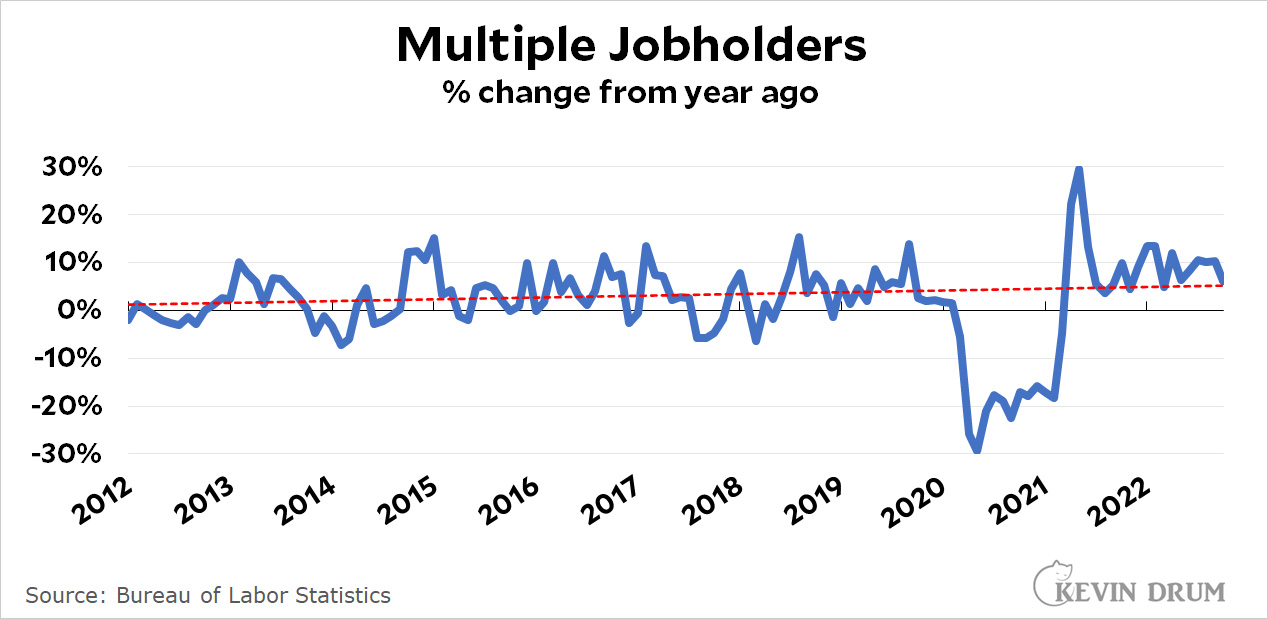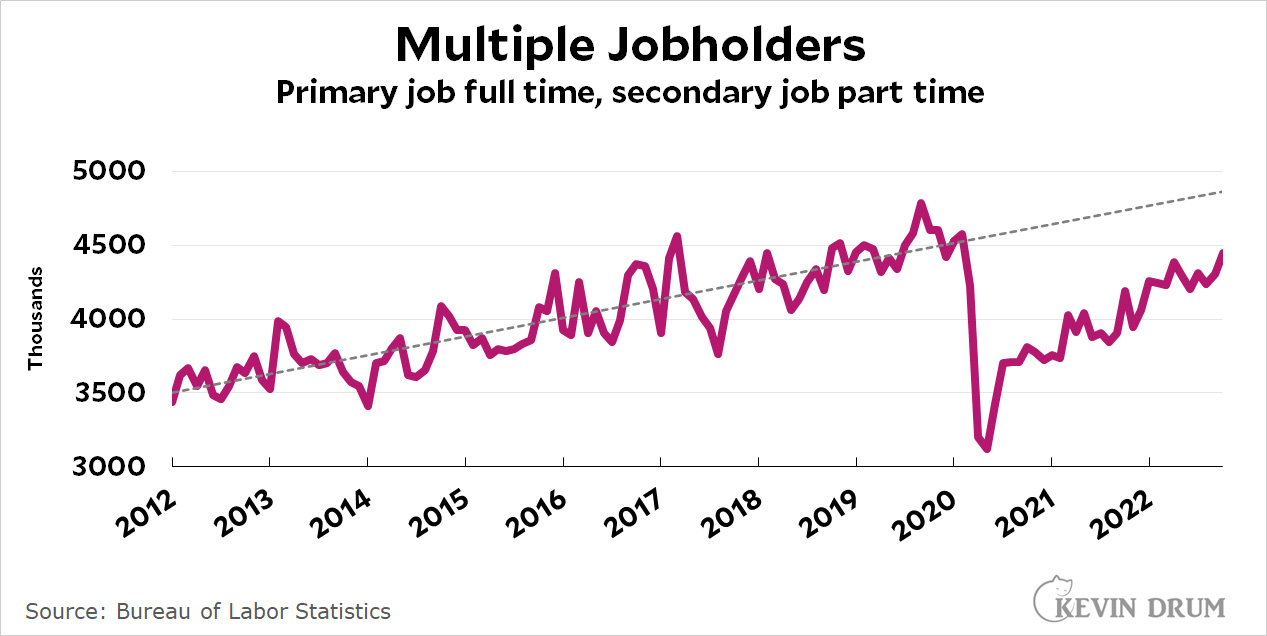Here is the Wall Street Journal commenting yet again on the economy:
As the holidays approach and America’s full-time workers feel pinched by inflation, some are turning to second jobs to supplement their incomes. The October jobs report shows the number of Americans working part-time jobs in addition to their full-time jobs has increased 6%, year-over-year, to 4.5 million people, according to statistics from the Labor Department.
Nearly three-quarters of workers said they need additional work to make enough income due to inflation, according to an October survey of more than 1,700 U.S.-based employees by job search website Monster.com. A separate survey of more than 4,700 people conducted by Prudential Financial Inc. found 81% of Gen-Z and 77% of millennial workers said they have pursued gig work or are considering additional side work this year to supplement their income.
Part-time work increased 6% in October! Let's take a look at that:
 First off, the number of people taking part-time jobs increased 8% in June, 10% in July, 10% again in August, and 10% yet again in September. The 6% increase in October is, if anything, an indication that the number of people looking for side hustles is easing.
First off, the number of people taking part-time jobs increased 8% in June, 10% in July, 10% again in August, and 10% yet again in September. The 6% increase in October is, if anything, an indication that the number of people looking for side hustles is easing.
And then there's this:
 The number of people with multiple jobs is going up, as it always does during economic expansions, but is still well below its pre-pandemic trendline.
The number of people with multiple jobs is going up, as it always does during economic expansions, but is still well below its pre-pandemic trendline.
Why does the Journal do this? They are constantly either misrepresenting statistics or else not bothering to present them at all, relying instead on idiotic surveys from the likes of Monster.com that mean nothing at all. In what world of honest journalism do you write that the number of workers with multiple jobs has gone up 6% without (a) noting that this is below the recent average (b) the previous three months were all at 10%, and (c) we're still way below our pre-pandemic level?
Or they could have put up a chart. They have a whole department for that. But that would have given the game away instantly.
Everyone at the Journal who touched this article knew this. Everyone. The article is worded too carefully to draw any other conclusion.¹ But by god, they wanted a trend piece, so they got it. And if they had to do it by deliberately misleading their readers, so be it. Disgraceful.
¹There is never any flat statement that the number of part-time workers is at a record level, or even that it's up from normal. Merely a carefully curated set of statistics designed to give a strong implication. Take it from me, that doesn't happen by accident.

A Murdoch publication lying.
Oh.
Why does the Journal do this?
Because they're owned by Rupert Murdoch.
Decades ago, the WSJ used to be a pretty good news source, especially for business news. The editorial page was almost the opposite to the point that it was full of good investment advice as long as you knew that you had to reverse the polarity. About 15 years ago, their business coverage started to get a lot thinner, and they stopped having their great regional / industry / company profile articles. By ten years ago, the WSJ was worthless unless you really wanted the editorial page for bad business advice.
Bloomberg seems to have picked up a lot of the slack. If nothing else, their $30K a seat data service subscriptions subsidize a lot of their reporting, and most of that reporting is available for roughly the same price as the WSJ. It's a whole lot better, and while my opinions and Bloomberg's don't always line up, the Bloomberg editorial content covers much broader ground and has some really sensible writers.
They say that most news is suspect except for the stuff on the business and sports pages because people rely on those for making decisions about money. That was probably true back when there were half a dozen or more competing newspapers in every major city. It's much less true now. It's a pity. The WSJ used to be a pretty good source for business news.
FT has always been great, though it's no substitute for a US-based publication if the American economy and business scene is your focus.
Why does the Journal do this?
Because their mission is to help Republicans defeat Democrats.
Even in the "news" department. Trading on the pre-Murdoch reputation kaleberg mentioned, which, like prices, is sticky in decline.
This doesn't speak highly of how WSJ views its readership, does it?
I managed to be one of the people getting a second part-time job in October. But that was all about the start of the school year, not underlying trends.
It takes a thief?-)
Did anybody mention that WSJ is owned by Murdoch? Ah yes.
How come Kevin can figure out that Fox news is a toxin, but doesn't figure out that WSJ comes the same cesspool?
Kevin - the article had a byline - "Ray A. Smith" - https://www.wsj.com/news/author/ray-a-smith Why not include that name in your blog post. It's not like the he's not complicit.
If there were even minor consequences for being complicit (like showing up in a Google search, as a stooge for the WSJ), then maybe WSJ journalists would be more inclined to push back. Or would have to be paid more to be stooges?